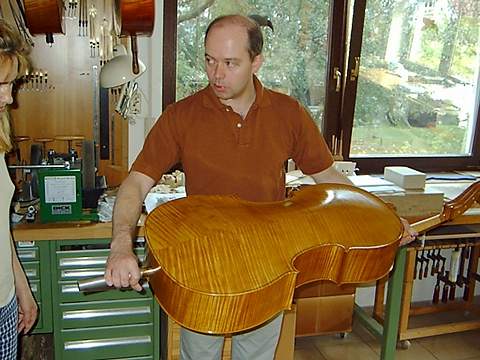|
<< -- 2 -- Tess Crebbin FIFTH GEAR

Can a cello actually have a character of its own? Indeed, according to the well-known German cello maker Wolfgang Schnabl, also present at Kronberg this year. He lives and works just outside Nuremberg and exports his cellos all over the world. 'My father is a violin maker,' Schnabl says, 'but I chose to specialise in cello because no other instrument is capable of expressing the range of human emotions quite as clearly and no other instrument has as many human qualities. Just take, for instance, the warm, human-like tone of a cello. Also, the cello has a mind of its own: it can have bad days, when it doesn't play as well as it usually does. It sounds off, maybe because it doesn't like the weather, the season. A cello does not react to each player the same: it does not like it when you shift gears on it like you might with a Ferrari and try to rush it through a concert sequence. It does not like to be beaten up for a fortissimo and if you do this, it will get back at you by giving you a rather tinny sound. A cello needs your interpretative sensitivity and then it opens up for you. This may take weeks, or a lifetime, or months. If you don't have soul, then you can't put it into your cello. You may have technique, and the instrument will technically give you the notes, but that is it. Let me give you an example: I had a very good cello that I loaned to a cellist once who took it abroad for some performances, and handled it rather roughly. Cellos do not like this, actually. So when the instrument came back to me, it was all upset and it took me weeks of stroking and patting it musically until it opened up again and got its confidence back.'

Wolfgang Schnabl in his workshop. Photo © 2004 Philip Crebbin
|
A cello-nut? Depends how you look at it. Cellists speak of their instruments as something that is part of them, like an arm and a leg perhaps. When their cello is stolen or lost, they'd rather put up a big reward to get it back than buy a new one. 'One of the reasons that I chose cello as my instrument is because it is the only instrument that can display the whole range of the human voice and its corresponding emotions,' says the Swedish cellist Frans Helmerson, a jury member at this year's PCCC. 'Were the cello an opera singer, it would be a mezzo or a baritone, but it would also be a singer with a superhuman range, spanning the highest soprano notes as well as the lowest bass. No other instrument is capable of displaying the range of human emotions quite as strikingly.'
Refreshingly, the jury members are not only present at Kronberg in order to judge others. They also show their stuff during the traditional Jury Members' Presentation Concert, which was also the first official concert during this year's PCCC, on 28 August at the Johanneskirche (St John's Church) in Kronberg. The Russian piano-genius Pavel Gililov, who had only recently arrived back from Japan and was about to travel on to his own festival near Kassel, made time in his heavy schedule to partner the two cellists and jury members Frans Helmerson and Young-Chang Cho.
Not surprisingly, with this being the first year that Kronberg takes place sans Boris Pergamenschikow who was so closely associated with the place, the first concert is very much loaded with references to the late star-cellist. Gililov, the award-winning pianist from St Petersburg, has been in the West since 1978 and has built his reputation here with numerous CD recordings partnering his childhood friend Pergamenschikow. He is now active as a soloist and chamber musician and teaches a masterclass at the Cologne Music Academy as well as presiding over his own annual summer music festival. As for Helmerson, he was Pergamenschikow's choice of successor when the Russian was called off to join the prestigious Hans Eisler Academy of Music in Berlin as professor for cello and his teaching position in Cologne was vacated. So Gililov and Helmerson now teach together at Cologne, Helmerson having taken Pergamenschikow's place there.
Continue >>
Copyright © 8 September 2004
Tess Crebbin, Kronberg, Germany

|

